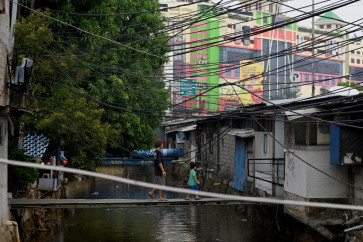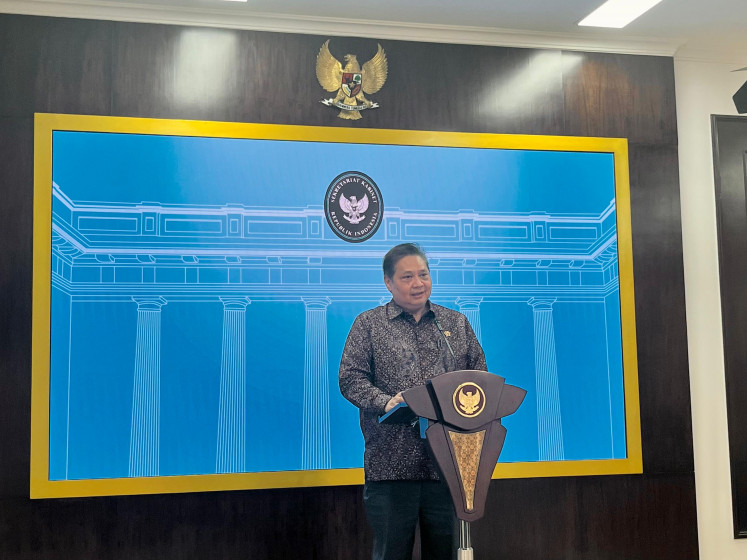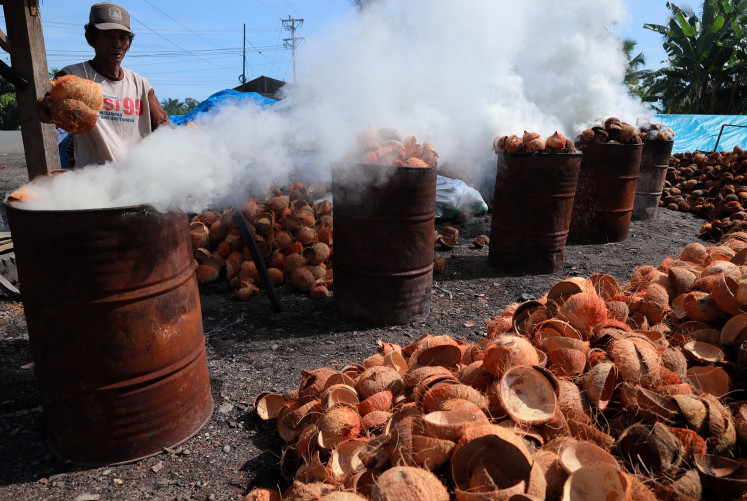'Dahlia' fosters conservancy
A woman crosses a bridge in Lubuk Beringin village in Jambi province
Change text size
Gift Premium Articles
to Anyone

A woman crosses a bridge in Lubuk Beringin village in Jambi province. Women in the village have initiated a micro credit institution that aims to improve their local economy while ensuring the preservation of local forests. (JP/Asep Saifullah)
Dahlia is the name of a flower which many women around the world know and adore.
In Lubuk Beringin village, Jambi province, women have used the name Dahlia for a micro credit institution which they manage collectively to support their daily needs, and to conserve forests in the process.
Like a flower, the Dahlia micro credit institution -- or Dahlia Independent Community Organization to be precise -- grew from a tiny seed.
The organization was born when the Indonesia Conservancy Community (KKI) Warsi (a non-government organization working in environmental conservation) was conducting a program with Lubuk Beringin villagers.
Through the Kerinci Seblat National Park Integrated Conservancy Development Project which ran from 1990 to 2002, KKI Warsi advocated villagers -- men and women -- to empower and develop an institution to improve their economy and manage natural resources in a sustainable way.
KKI Warsi facilitated the village women, all Muslim, to meet every Friday. Their group first held religious lessons and then worked on a money sharing lottery system.
"The activity began in August 2000," KKI Warsi advisor Rudy Syaf recalled.
At every meeting, each Dahlia woman was obliged to submit between Rp 1,000 (10 US cents) and Rp 2,000 for their share in the lottery, and another Rp 1,000 for the religious lessons.
Eventually, the group managed to develop a credit institution that they had hoped for. They began collecting private funds of Rp 6,000 per person -- Rp 5,000 for a main share and Rp 1,000 for monthly savings.
"By mid 2001, the group members were able to take out loans for Rp 100,000 which they were required to repay within 10 months," Dahlia chairwoman Nur Asiah said.
Since they have an institution to support their financial needs, the group has a new source of money that is easy for them to access, especially in times of emergency.
Things were different before Dahlia was established. In the past, most farmers relied on selling rubber they collected from plantations.
"But now, we have found an alternative financial resource, thanks to Dahlia. We're glad to see it has progressed so well, considering that the idea to set it up came to us spontaneously while we were doing our laundry at the stream one day," Nur said.
Dahlia is moving ahead, aiming to become a cooperative unit with a sound legal basis.
Each year, Dahlia holds an annual meeting where some of its profits are distributed among members.
"We spend the other money on new investments and save the rest for the village for operational costs of our conservation work.
"We encourage villagers to care more for the environment," said Muhammad Jufrie, a facilitator for Dahlia who is also a member of village staff.
Lubuk Beringin villagers' main source of income comes from rubber trees which grow well in the extensive forests in the area. They also have a micro hydro power plant which they built in a river nearby.
"If the environment is damaged or the forests degraded, we won't see that turbine going round any more, and we'll soon find ourselves living in the dark," Jufrie said.
Dahlia now owns assets worth a total Rp 200 million, and has grown to become the backbone of the village economy.
But the villagers are not about to rest and feel satisfied with their achievement.
"We're still trying to find ways to sell raw rubber directly to factories so we can get better prices and cut the complicated distribution chain," Nur Asiah said.
Like a flower, the Dahlia from the dense Jambi forest is now blooming.
-- Asep Saifullah









